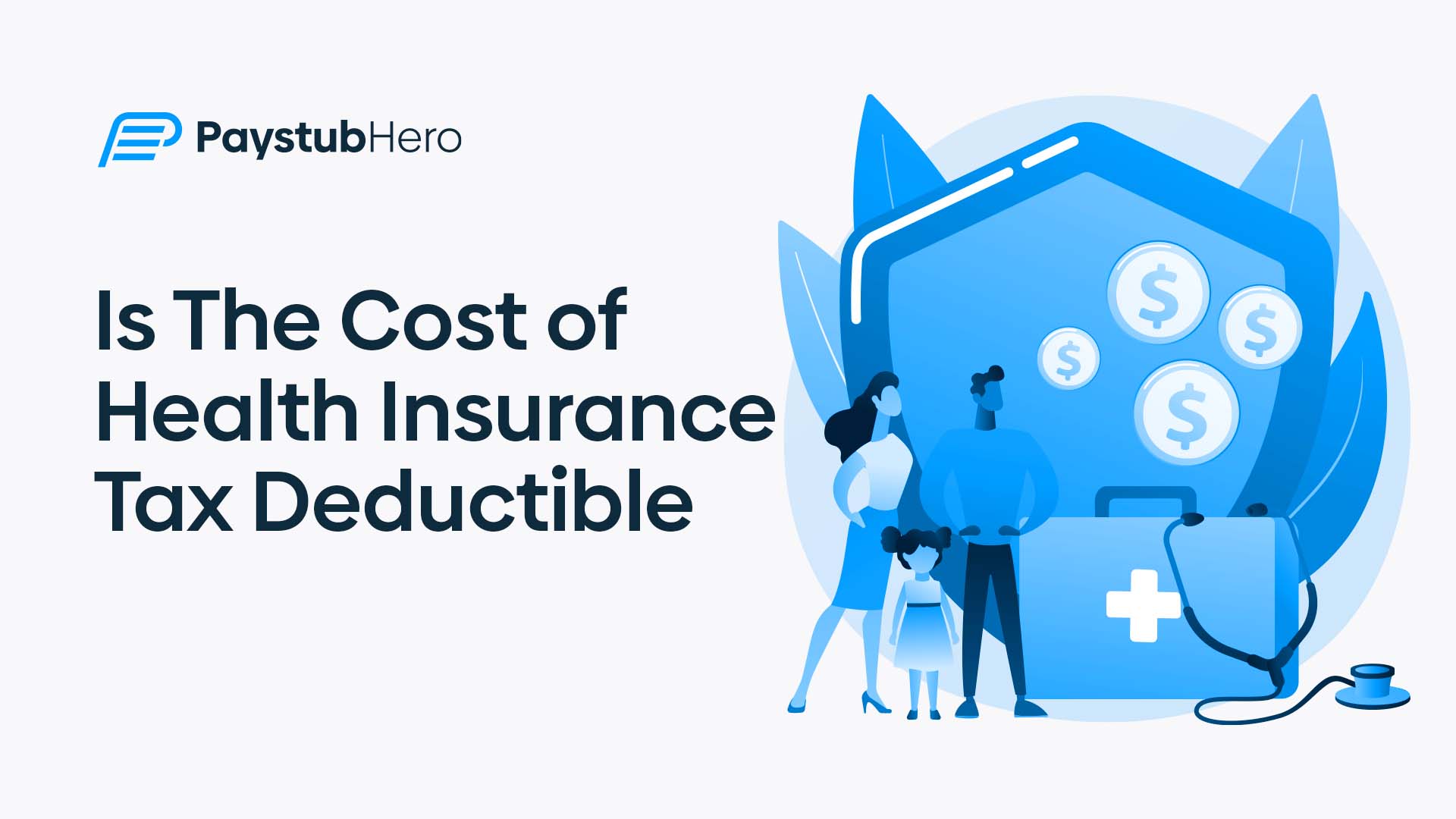Is the cost of health insurance tax deductible? Health insurance premiums can help reduce medical bills, but can their costs be tax deductible? The answer is yes, and it depends on how you get your health insurance and how you file your taxes.
In general, if your employer sponsors your health plan, you likely won’t be able to deduct those premiums. But if you’re self-employed or pay for your own plan outside of work, there might be a tax benefit.
Let’s get into the details to see if you can deduct your health insurance costs and save some money in tax time.
Health Insurance Tax Deduction Basics
A health insurance tax deduction allows you to reduce your taxable income by the amount you pay for qualified health insurance premiums. This translates to a lower tax bill.
How it works:
• You pay health insurance premiums throughout the year.
• When you file your taxes, you can deduct some of these premiums from your taxable income, reducing your tax liability. However, there’s a minimum threshold you need to meet.
• To claim the deduction, you must itemize your deductions on your tax return.
Itemizing Deductions for Health Insurance
Itemization lets you claim certain expenses on your tax return instead of using the standard deduction from the IRS. This can benefit health insurance costs, but there are some things to consider before taking advantage.
Requirements for Itemizing:
• You must keep detailed records of all your medical expenses throughout the year. This should include receipts and explanations of benefits (EOBs) from your insurance company.
• You can only deduct expenses you paid for yourself, your spouse, and your dependents.
Limitations and Thresholds:
• There’s a threshold you need to meet before medical expenses, including health insurance premiums, become deductible. Only the amount exceeding a specific percentage (usually around 7.5%) of your Adjusted Gross Income (AGI) qualifies for deduction.
Calculating the Deductible Amount:
• Gather all your medical expense receipts and EOBs.
• Add up all your qualified medical expenses, including health insurance premiums, prescriptions, co-pays, and out-of-pocket medical costs.
• Calculate 7.5% of your AGI.
• Subtract the 7.5% figure from your total medical expenses. This amount is your deductible expense.
Here’s an illustration.
John and Jane pay $6,000 annually for their health insurance plan. Their combined AGI is $80,000. The minimum threshold for deducting medical expenses is typically 7.5% of their AGI, which is $6,000 (7.5% x $80,000).
Since their health insurance premium exactly meets the threshold, John and Jane wouldn’t see a deduction in this scenario.
However, if their premiums were even slightly higher, say $6,500, they could deduct the amount exceeding the threshold—which is $500 ($6,500 premium—$6,000 threshold).
This deduction would then lower their taxable income and potentially lead to tax savings.
When Health Insurance is Not Tax-Deductible
Here’s the breakdown of when your health insurance might not be tax-deductible:
1. Employer-Paid Premiums
This is the most common scenario. If your employer provides your health insurance, you can’t deduct the premiums they pay on your tax return.
This is because you never actually see that money. Your employer pays it directly to the insurance company.
2. Subsidies and Premium Tax Credits
Let’s say you buy health insurance through the ACA marketplace. It can be expensive, but luckily, they offer discounts like subsidies or tax credits. These discounts act like a helping hand, lowering the actual amount you pay for the insurance.
Because the credit reduces what you’re truly spending on insurance, you can’t deduct that discounted amount from your taxes. It’s like you already got a tax benefit by paying less upfront!
You wouldn’t deduct a friend’s gift towards your groceries, this works similarly.
3. Pre-tax Payment Scenarios
This isn’t very common, but your employer might allow you to pay for health insurance premiums with pre-tax dollars in some rare situations. This reduces your taxable income slightly.
However, even with pre-tax payments, you still cannot deduct those premiums on your tax return.
4. If You’re a W-2 Employee
Being a W-2 employee means you receive a W-2 tax form from your employer. Now, if you are one, you can’t deduct your health insurance premiums, even if you pay for it all yourself.
This is because the standard deduction is typically higher than most medical expenses. A standard deduction is a fixed dollar amount you can subtract from your taxable income.
It only makes sense to itemize deductions (listing individual expenses) if the total of your medical expenses + premiums exceeds the standard deduction.
Deducting Health Insurance for the Self-Employed
The self-employed health insurance deduction is available to those who truly shoulder the weight of their health coverage costs.
Here’s who qualifies:
• Self-Employed with Net Income: Your primary source of income comes from your own business or freelance work, and you have a net profit from that activity.
• Independent Coverage: You’re responsible for paying the total cost of your health insurance premiums. This deduction isn’t applicable if you can access employer-subsidized health plans, even through a spouse’s work.
• Qualified Plans: The health insurance plan you hold must be a qualified medical, dental, or long-term care insurance plan.
Claiming Your Tax Advantage
It’s easy to use the self-employed health insurance deduction. Just keep track of all your health insurance payments during the year. When it’s tax time, use Form 1040 with Schedule 1.
Schedule 1 helps you list your deductions, including health insurance costs. This lowers your taxable income, which could mean you pay less in taxes. However, there’s a limit.
The deduction can’t exceed your net income from self-employment.
Now, is there a way to maximize this tax advantage? Yes.
Maximizing Your Health Insurance Tax Deductions
Here’s how to maximize your health insurance tax deductions and save some money:
• Consider High-Deductible Health Plans (HDHPs):
These plans typically have lower monthly premiums but come with higher deductibles (the amount you pay out of pocket before insurance kicks in).
The good news is, that you can pair an HDHP with a Health Savings Account (HSA).
HSAs allow you to contribute pre-tax dollars to cover qualified medical expenses, including your deductible. Unused funds roll over year after year and can even be used for non-medical expenses in retirement.
• Keep Records:
Save receipts and documentation for all health insurance premiums, medical bills, and qualified medical expenses throughout the year.
This will be crucial when claiming deductions on your tax return.
• Bundle Your Coverage:
If you have dental or vision insurance separate from your health insurance, consider bundling them into one plan.
This might not always decrease the overall cost, but it can simplify your record-keeping and potentially increase your total medical deductions.
Conclusion
In conclusion, the tax deductibility of health insurance premiums depends on one’s employment situation and how one pays for insurance.
The premiums are not tax-deductible for most people who get health insurance through their employer. However, if you are self-employed and pay for your health insurance, you can deduct the premiums from your taxes.
This article provides a helpful overview, but it’s important to remember that everyone’s tax situation is unique.
FAQs
Common questions about health insurance tax deductions.








